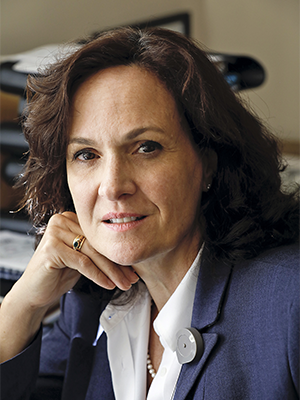NICHD Pediatric and Adolescent Gynecology Training Program

- Veronica Gomez-Lobo, MD, Program Director
- Tazim Dowlut-McElroy, MD, Associate Program Director
- Jacqueline Maher, MD, Staff Clinician
- Allison Mayhew, MD, Clinical Fellow
- Shashwati Pradhan, MD, Clinical Fellow
The Pediatric and Adolescent Gynecology (PAG) Fellowship training program is a two-year program, not accredited by the ACGME (Accreditation Council for Graduate Medical Education), comprising faculty from the National Institute of Child Health and Human Development (NICHD), Children's National Health Systems (CNHS), and MedStar Washington Hospital Center (MWHC). The mission of the fellowship program is to ensure that the graduate possesses the knowledge, skills, and professional attributes essential for the function as a consultant to pediatricians, family practitioners, obstetricians, and gynecologists for girls from birth up to age 18–21 years with pediatric gynecologic concerns, as well as for women born with congenital anomalies. Qualified candidates must be U.S. Citizens or Green Card holders and have completed an accredited residency in Obstetrics and Gynecology in the United States and be Board-eligible in this specialty.
Program structure
The first-year fellow will attend most PAG clinics as well as Heavy Menses and Special Gynecologic Endocrine clinics at MedStar and CNHS. The second-year fellow will attend Vulvar Dermatology clinics. Fellows alternate attendance at Turner syndrome clinics, PROUD (positive reevaluation of urogenital differences clinics, and DSD (disorders of sex development) clinics at CNHS and consult services at NICHD. These outpatient services do not depend on fellows for clinical care, which will allow flexibility to maximize the educational experience. Surgeries will be performed by the fellow on call with a resident, and the fellow will function as the surgical instructor during such cases. Complex surgeries will be performed by both fellows as co-surgeons. Rotations, including one month in Child Abuse and 2–4 weeks of pediatric surgery at CNHS, will be scheduled during the second year of fellowship; electives in Adolescent Medicine (eating disorders), as well as to travel to other sites for further complex anomaly training will be available.
For successful completion of this training program, the fellow will design, implement, complete, describe, and report at least one research study. A second multi-center project is to be designed and submitted, or collaboration with a project submitted to the Fellows Research Network at North American Society for Pediatric and Adolescent Gynecology (NASPAG) will be required. During the fellowship, fellows will have thirty percent of their time protected for clinical research. The research will take place throughout the two years of training on 1.5 weekdays, except during outside rotations.
Structured training includes a series of introductory seminars geared to the first-year fellows, which takes place from July to September of the first year. The introductory seminars provide a historical perspective and basic understanding of the practice of Pediatric and Adolescent Gynecology and Reproductive Endocrinology, as well as of statistics. Fellows are required to attend a weekly colorectal conference, a monthly DSD clinic conference, a monthly Turner’s clinic conference, PAG Journal Club/research meeting, and lectures. In addition, fellows are encouraged to attend the monthly Reproductive Endocrine Journal club and DSD-TRN (Translational Research Network) case conference.
In addition to larger groups, mentors of individual laboratories to which the fellow is affiliated generally meet on a weekly basis to review research progress. Furthermore, fellows are encouraged to participate in didactic training offered at national meetings, such as the North American Society for Pediatric and Adolescent Gynecology, the American Society for Reproductive Medicine, the Society for Gynecologic Investigation, and the Pediatric Endocrine Society. Moreover, fellows are encouraged to attend specialty meetings in their chosen interest areas, such as the Oncofertility Consortium and Differences in Sex Development–Androgen Insensitivity annual meetings.
Application information
Applications are submitted using the common application form on NASPAG. Applications are accepted in July before the anticipated start date, and interviews are typically held in August or September before the start date. Selection of candidates is processed through the National Resident Matching Program (NRMP). One to two positions are available in alternating years.
Please visit the training program website for detailed program information.
Publications
- Moravek MB, Appiah LC, Anazodo A, Burns KC, Gomez-Lobo V, Hoefgen HR, Jaworek Frias O, Laronda MM, Levine J, Meacham LR, Pavone ME, Quinn GP, Rowell EE, Strine AC, Woodruff TK, Nahata L. Development of a pediatric fertility preservation program: a report from the Pediatric Initiative Network of the Oncofertility Consortium. J Adolesc Health 2019;64(5):563-573.
- Dowlut-McElroy T, Higgins J, Williams KB, Strickland JL. Treatment of prepubertal labial adhesions: a randomized controlled trial. J Pediatr Adolesc Gynecol 2019;32(3):259-263.
- Pecker LH, Maher JY, Law JY, Beach MC, Lanzkron S, Christianson MS. Risks associated with fertility preservation for women with sickle cell anemia. Fertil Steril 2018;110(4):720-731.
Contact
Veronica Gomez-Lobo, MD, Program Director
veronica.gomez-lobo@nih.gov
Tel: 301-594-1176
Sofia Getachew, MSPM, Program Coordinator
sofia.getachew@nih.gov
Tel: 301-451-1466
Pediatric and Adolescent Gynecology Training Program
NICHD, NIH
10 Center Drive
Building 10, Room 8N248, MSC 1840
Bethesda, MD 20892-23330


